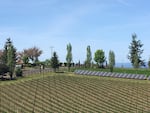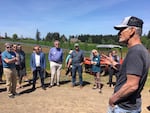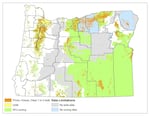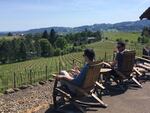As Oregon’s climate policies steer the state toward renewable energy like solar, its land use laws are putting up roadblocks.
On Thursday, the Oregon Land Conservation and Development Commission approved new rules that restrict commercial solar development on millions of acres of high-value farmland across the state.
The rule-making process pitted two of Oregon's most treasured values — protection of agricultural land and environmental stewardship — against each other.
The conflict is especially intense in Willamette Valley wine country, where many vineyards are simultaneously embracing solar energy while opposing commercial solar development.

The farm at Alloro Vineyards is powered by solar energy from a 54-kilowatt array on the property.
Cassandra Profita / OPB
On the Solar Winery Tour earlier this month, about 120 people celebrated wineries that have installed solar panels on their land and rooftops with a series of tastings organized by the advocacy group Solar Oregon.
“Look up in the sky. What do you see?” Solar Oregon president Corey Omey called out to the crowd of people gathered for the event. “You see sun!"
For the last seven years, the annual Solar Winery Tour fundraiser has been a smash hit for his group. After all, who can argue with the pairing of renewable energy and wine?
Quite a few winemakers, as it turns out — including one of the owners of a vineyard on this year's Solar Winery Tour.
"It’s kind of a controversial issue because we want to protect our ag land," said David Nemarnik, who owns the 34-acre Alloro Vineyard near Sherwood. "Yet I understand we have to have places to build these solar panels."

David Nemarnik talks with a group of tour-goers about the solar panels on his 34-acre vineyard.
Cassandra Profita/OPB
Nemarnik has a 54-kilowatt solar array on his fence line that provides all the electricity he needs for his farm. But that doesn’t mean he wants to see commercial solar farms on the land surrounding him in the Willamette Valley.
“The valley is prime farmland — the best soil in the world," he said. "Burning that up for solar panels may not be the best decision.”
Without farmland protections, Nemarnik said, his vineyard would have been a housing development.
“We wouldn’t be on this property if it wasn’t for our land use laws,” he said.
Wine growers and other ag industry advocates say now the threat to farmland isn’t rows and rows of houses but rows and rows of solar panels. That’s why they’ve pushed for new rules prohibiting commercial solar development on 3.6 million acres of the state’s best farmland.
By putting restrictions on land with high-value soils designated prime, unique, and classes I and II, the rules put about 6% of the state off limits — not to rooftop solar but to larger projects that cover acres of land. Solar developers would have to apply for an exception to the rule before their projects could be considered.

A map of soil types illustrates areas in orange that are subject to restrictions on commercial solar development.
Courtesy of Oregon Department of Land Conservation and Development
Nicole Hughes, executive director of Renewable Northwest, said the rules deal a major blow to the solar industry because together with other constraints they leave few if any options for projects near Portland where the energy is needed most.
“It will effectively shut down solar development in the Willamette Valley,” she said. "There’s very few locations in the state you can actually put a solar farm."
While Oregon’s land use laws have reduced urban sprawl and protected farmland, Hughes said, they were written more than 45 years ago and don’t say anything about where solar projects should go.
The state now faces new land use challenges, she said, as it aims to use renewable energy to replace the fossil fuels that are warming the planet and causing catastrophic wildfires and droughts.
“What’s the plan?" Hughes said. "We think all of Oregon’s land use goals are antiquated and probably need to be updated to address the impacts of climate change.”

Kevin Chambers owns Koosah Vineyard in the Willamette Valley near Amity.
Cassandra Profita/OPB
Koosah Vineyard owner Kevin Chambers represented the wine industry in the recent rule making process. He said it’s hard to see agriculture pitted against renewable energy, but solar development is just one more way to lose high-value farmland.
"It’s a difficult conundrum. Both of us think we’re doing good work,” he said. “We just feel quite strongly that to sacrifice farm ground, which takes millennia to develop is a serious mistake in the governance of land."
However, the new rules do include a compromise, Chambers said. They allow for 12-acre solar developments on lower quality, classes III and IV soils and for 20-acre developments that incorporate agricultural uses such as grazing or shade crops in between the panels. Even larger projects are allowed on farmland that isn't zoned for exclusive farm use.
Chambers said part of the reason the wine industry got involved in the rule making is because it's looking out for threats to tourism that the wine industry depends on.
“Let’s be candid," he said. "Folks don’t come to beautiful, bucolic regions like the Willamette Valley to look at commercial solar arrays.”

At Vidon Winery, visitors sip wine while looking out over fields of grapes in the Willamette Valley.
Cassandra Profita/OPB
But don’t tell that to Amy Palmer as she’s sipping pinot noir at the Solar Winery Tour.
“I would feel actually better if I was standing here seeing a field of solar panels than looking at a field of grape vines as I am now,” she said.
She and other advocates see solar power as a valuable resource Oregon farms can harvest in addition to other crops.
Hughes with Renewable Northwest said she expecting the new rules to be appealed.
